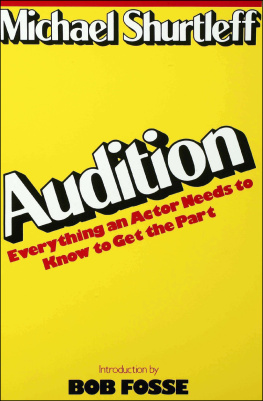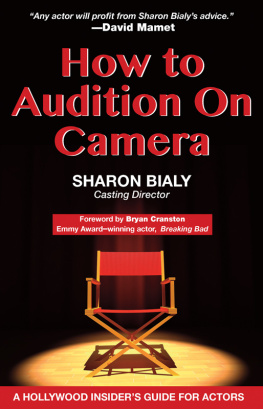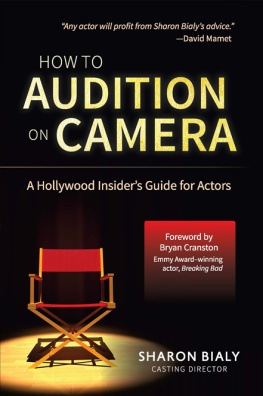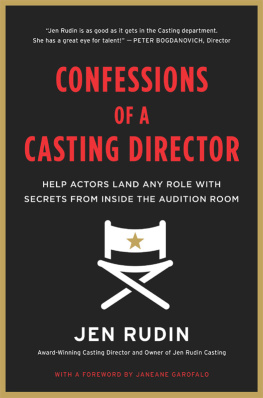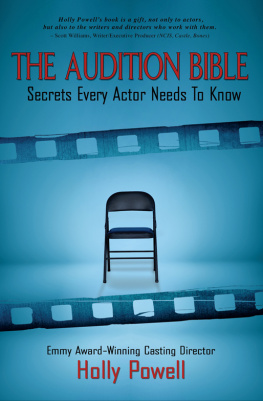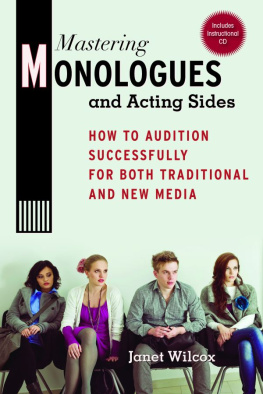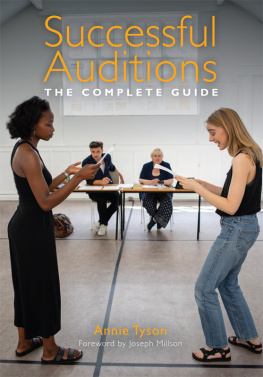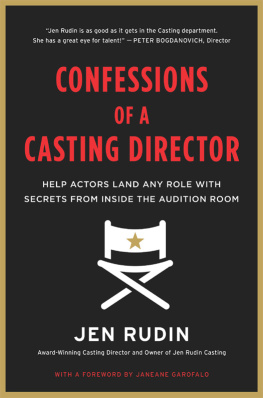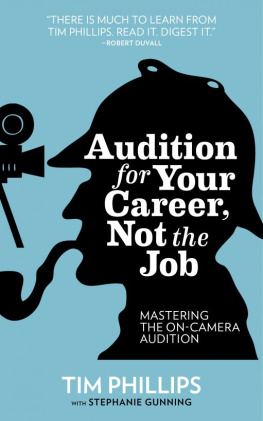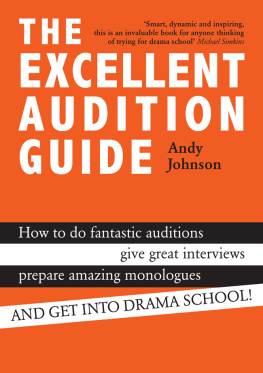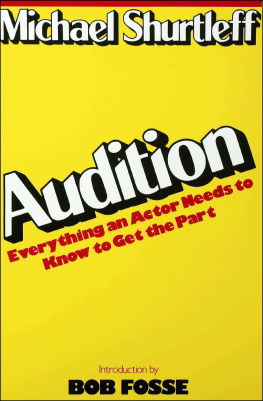Audition
Audition
Everything an Actor Needs
to Know to Get the Part
Michael Shurtleff

Bloomsbury USA
An imprint of Bloomsbury Publishing Plc
1385 Broadway | 50 Bedford Square |
New York | London |
NY 10018 | WC1B 3DP |
USA | UK |
www.bloomsbury.com
BLOOMSBURY and the Diana logo are trademarks of Bloomsbury Publishing Plc
First published 1978
This electronic edition published 2009
Michael Shurtleff, 1978
All rights reserved.
No part of this publication may be reproduced or transmitted in any form or by any means, electronic or mechanical, including photocopying, recording, or any information storage or retrieval system, without prior permission in writing from the publishers.
No responsibility for loss caused to any individual or organization acting on or refraining from action as a result of the material in this publication can be accepted by Bloomsbury or the author.
ISBN: ePub: 978-0-8027-1902-7
Library of Congress Cataloging-in-Publication Data is available.
To find out more about our authors and books visit www.bloomsbury.com . Here you will find extracts, author interviews, details of forthcoming events, and the option to sign up for our newsletters .
Bloomsbury books may be purchased for business or promotional use. For information on bulk purchases please contact Macmillan Corporate and Premium Sales Department at .
to Onna and to Keith
Contents
My thanks go to two remarkable Broadway producers, Stuart Ostrow and David Merrick, for their belief in me and for the inimitableopportunities they gave me to learn.
I have never written a foreword before, so I have no knowledge of its purpose. I called a few of my more literate friendsand asked them: Exactly what should a foreword accomplish? Their general consensus was that it should predict in some wayor other a little of what the reader might expect to follow. That sounds reasonable enough, but I sensed it was incomplete.I always tend to feel my friends are misleading meor at least telling me only part of what I should know. Of course, youcan only expect that from your closest friends.
Therefore, I read a few forewords to several "How To" books and even to some novels. I didn't learn too much from them. Onthe contrary, I found most of them too long, too academic, or, in some cases, as if the writer of the foreword was in competitionwith the writer of the book and was trying to out-write himso to speak. It was a little like a five-round preliminary writingbout. The foreword writer would swing a left obscure verb to the jaw and shortly follow with a seven syllable adjectiveonethat would immediately send me running to the nearest fat dictionary.
Feeling I wanted nothing to do with any of these approaches, I was forced to do my own thinking (something I try to postponeas long as possible) about what I would like to say about Michael Shurtleff and this book.
First off, I would like to go on record as saying that I consider this book to be absolutely indispensable to any aspiring, or even mildly ambitious, actor. There is NO book of which I am aware that gives an actor such first-rate,clear-cut, no-nonsense advice. God knows there have been a goodly supply of books written about acting and the theatre, butnone that I've read are so usefully straightforward and practical as this one.
I have seen many talented actors not get hired simply because of a poor audition. It happens all too frequently in the theatreand in films, too.
Michael explains to the reader all the possible situations and predicaments an actor might expect. Most importantly, he explainsclearly how to deal with them. He even goes into such details as dress. Not important, you say? Oh, no? Well, read on.
Although the book is directed to helping actors audition successfully (by that I mean gain employmentget the partsomethingwhich is extremely difficult in today's market; is it 80 or 90 percent of Actor's Equity who are unemployed?), I began tothink that with a little imagination, a little transcribing in the reader's mind, how useful this book can be to people outsidethe theatre. After all, isn't a business interview an audition in a way? Isn't a first date? In today's world everything seemslike some sort of long audition to me.
Now I'd like to say a few words about the author, Michael Shurtleff. I hope he doesn't read this because I'm sure he wouldbe embarrassed by my affection and admiration for him. I know no man I trust more in the theatre. Whenever I'm undecided aboutscript, actors or anything pertaining to a show or a movie, I know I can always turn to Michael, ask his opinion and get anhonest, no-bullshit answer. In a business where most are playing it cautiously, just "in case" something should go wrong,this is indeed a rare quality.
He has probably seen more actors audition than anyone in the theatre today. He has been instrumentaland sometimes totallyresponsible for getting more unknown actors their break than anyone I know.
He is a totally dedicated man. In the past fifteen years or so, I think he has seen just about every play or musical on Broadway,Off Broadway, Off-Off Broadway, those done in lofts, studios, backs of stores and, I'm sure, even in living rooms. He lovesactors (something not always easy to do; but Michael does care about them). Many times at a casting session, I have seen himwince in pain after a particular actor or actress had done a bad or mediocre audition. Noticing his expression (which reallyisn't accurately a "wince," since Michael doesn't "wince;" but he does have an expression that comes close and could passfor a wince), I would ask, "Why?" He would painfully reply, "I don't know why that actor did it that way. He's really talented.Doesn't he realize he just did himself in?" Then, after a pause, "Couldn't you read him again?" Most usually I would. I do trust his instincts.
There was no doubt Michael's pain was sincere. I imagine that pain and his desire to help young actors is what motivated thewriting of this book.
There is one other of Michael's many attributes I think worthy of mention. At least I found it unusual. As a casting director,he was always looking for and desperately trying to help the director find the "off-beat" actor. The one that you wouldn'tordinarily cast in that role, but one that has some very special qualitya quality that just might turn an ordinary part intoa brilliant one. Michael has a keen eye for spotting just such an actor. Of course, it is not always easy to sell the "off-beat"casting idea to a director. They generally tend toward typecasting. Not me, of course, but those other fellows.
I believe I have said enough. Oh, yes, just one other thing: Because of my aforementioned affection for Michael, I would likehis book to sell; and being somewhat aware of today's tastes, I thought I should make mention of the rather explicit erotic passages near the endof the book. Just because Michael is always honest doesn't mean I have to be.
BOB FOSSE
I.
Is it generally known that an actor's life is a difficult onenot glamorous, most of the time, and filled with disappointmentand rejection and hard work? We who spend our lives working in the theatre know this so well that we may mistakenly assumethe rest of the world knows, too. Yet clearly not, or no one would come from the ranks of civilian life to enlist in the worldof acting. Many do. The dream still exists: one's name up in lights, one's face up there on that giant screen, the adorationof the public, great romance, fame and glory.
Next page
